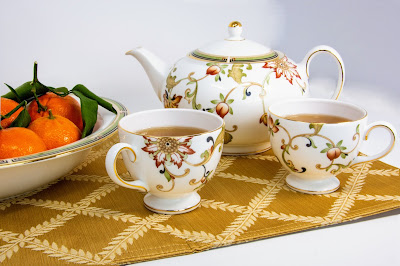“…and she feeds you tea and oranges that come all the way from China…”
If you’re a fan of folk music or remember the ‘60s, you may know
these famous lines from Leonard Cohen’s song Suzanne. There’s something
about the line that feels mysterious and delightful. Tea and oranges are
both simple but wonderful treats that humankind has been enjoying for generations, and there has long been a lucrative worldwide trade in both.
In a lot of ways, they just seem to “go” together…and for many years, in many
ways, they have.
Oranges, Tea, and...Everything
One can buy tens, hundreds, or perhaps even thousands of loose-leaf teas and tea bags with oranges as one of their flavors, or the primary flavor. One thing I’ve noticed about the sweet, fresh taste and scent of oranges is that they seem to go with almost everything. I have seen tea flavored with orange and: cloves, cinnamon, ginger, passionfruit, peach, lemon, licorice, hibiscus, mint, lemongrass, apple, lavender, vanilla, and schizandra berries (don’t ask me what those are), to name a few.
Healing Powers?
Delicious Orange Tea Treats
Of course, sometimes “tea with oranges” is purely a culinary
delight. Have you heard of “Russian tea”? While tea is a major part of Russian
culture, the "Russian tea" made popular here in the US doesn’t bear much, if any, resemblance to the strong and often smoky tea consumed in that culture. This
cozy hot drink became popular in the southern US in the '60s and '70s and is often associated with church cookbooks and church gatherings; it usually contains black tea, orange juice or orange peel,
and spices like cinnamon and cloves. There are even some “instant” versions out
there that include Tang! (Remember Tang? Yikes.)
I've learned of another treat that combines jasmine tea with orange juice. Jasmine tea, if you’ve never had it, is a wonderfully delicate
tea that combines tea with the indescribably haunting fragrance of
jasmine flowers. Made by layering drying tea leaves with jasmine blossoms, the tea is very special. This drink plays off the floral and sweet flavors of the
tea, and is served either hot or cold. I can imagine this
being really wonderful with freshly squeezed and strained juice.
Let’s not forget about orange iced tea, a classic for good
reason. Often associated with the south, this drink may be made by brewing one
of the many “orange teas” previously mentioned, by adding fresh orange slices to regular
black iced tea, or by combining iced tea with orange juice. Sometimes mint is
included to make the flavor even fresher. No matter how you prepare it, the
addition of fresh orange flavor to this delicious drink is perfection.
So what’s the story with the “tea and oranges” in Cohen’s song? I was delighted to learn that the tea mentioned is apparently one that my own mother has enjoyed for years, Bigelow’s Constant Comment. Many decades ago, the family behind this tea discovered an old recipe that included orange peel and warm spices, and gave it that name because of the “constant comments” they got on its delicious flavor. The rest, as they say, has been history for this classic pair.




